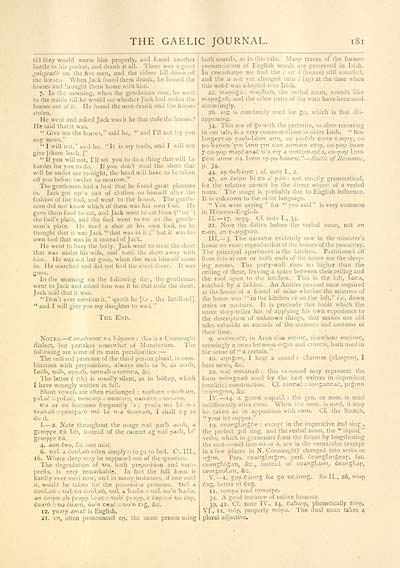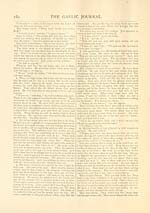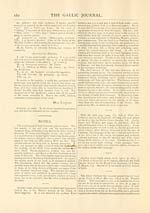Download files
Complete book:
Individual page:
Thumbnail gallery: Grid view | List view

THE GAELIC JOURNAL.
i8i
till they would warm him properly, and found another
bottle in his pocket, and drank it all. There was a gre;it
^a'ugeadk on the five men, and the riders fell down off
the horse;. When Jack found them drunk, he loosed the
•horses and brought them home with him.
7. In the morning, when the genileman rose, he went
to the stable till he would see whether Jack had stolen the
horses out of it. He found the men drunk and the horses
stolen.
He w-ent and asked Jack was it he that stole the horses ?
He said that it was.
" Give me the horses," said he, " and I'll not try you
any more."
" I will not," said he. "It is my trade, and I will not
give [ihem back.]"
" If you will not, I'll set you to do a thing that will be
harder for you to do. If you don't steal the sheet that
will be under me to-night, the head will have to be taken
off you before twelve to-morrow."
The gentleman had a fool that he found great pleasure
in. Jack got up a suit of clothes on himself after the
f.ishion of the fool, and went to the hmise. The gentle-
man did not know which of them was his own fool. He
gave them food to eat, and Jack went to e.at from ("on")
the fool's plate, and the fool went to eat on the gentle-
man's plate. He fired a shot at his own fool, lor he
tliought that it w-as Jack " that was in it ;" but it was his
own tool that was in it instead of Jack.
He went to bury the body. Jack went to steal the sheet
that was under his wife, and took the sheet away with
him. He was not but gone, when the m.m himself came
in. He searched and did not find the sheet there. It was
gone.
In the morning on the following day, the gentleman
went to Jack and asked him was it he that stole the sheet .
Jack said that it was.
"Don't ever mention it," quoth he [î'.f , the landlord].
" and I will give you my daughter to wed."
The E.nd.
Notes. — Cjiiaiìiuiiic ha liii\jnn : this is a Connauglu
dialect, but partakes somewhat ui Munsterism. The
following are si'Uie of its main peculiarities : — •
The suffixed pronoun of the third person plural, in com-
bination with prepositions, always ends in b, as .\cob,
leób, ■oób, opp..\b, iorinAb = ioniic<i, &c.
The letter c (th) is usually silent, as in bóüA)\, which
I have wrongly written in full.
Short vowels are often exchanged : ■Doirii<Mn = r>otiiAin,
pOklic = pob.ic, üeoc.ii|\="oe.iCAi|\, eAUAnn — ion.inn.
Oa or eu becomes frequently 'a : piAcA me be n-.i
'ôuMiATC) = peucp.ii'ó me be ti-A ■oeutiam, I shall try to
do it.
I.— 2. Note throughout the usage iiic \\à.\\> Acob, a
jcuippe CÚ lei, instead of the correct 05 n.ic i\4ib, Le'
gcuippe cij.
4. aoii ceo, lit. one mist.
6. ■oul A coTilOkw often simply^to go to bed. C(. III.,
16. Where sleep may be supposed out of the question.
The degradation of ■00, both preposition and verl)-
prefix, is very remarkable. In fact the full form is
hardly ever used now, and in many instances, if one useti
it, would be taken for the possessive pronoun. T3ub 4
cooIaw = Dul -00 coobwib, Tiub 4 b.iile = t)ub oo'ii bji'Le,
a.n ceiivo &\> ^eA\\\\ beJic^TJob' ỳeAivi\, e cup = é •00 cup,
cU4i'D=t)o cuiió, -öo'n ce<\c:^'oo'ii cig, &c.
12. i^uAip AtiiAc is English.
21. cii, olten pronounced cp, the same person using
both sounds, as in this tale. Many traces of the former
pronunciation of English words are preserved in Irish.
In cneiiiioiipe we find the c or /• (knave) still sounded,
and the a not yet changed into t" (ay) at the time when
this wo'rd was adopted into Irish.
22. mipogi : mapboiẃ, the verbal noun, sounds like
mo.pu5<s-ô, and the other parts of the verb have been used
accordingly.
26. A15 is con>tantly used for 50, which is fast dis-
appearing.
34. This use of 50 with the preterite, so often recurring
in our tale, is a very common idiom in older Irish. "' II0-
bnijepcAp pAeb-Léim Ant), co po-cib coito CAipip, co
po-bAX)eo "pni bno pin cau AnniAin ecip, co-pop buAn
7 co-pop iiiApcAndc t)'a éip a mnconiApcA, co-pop bino
TTéic Ainm iiA binni ip-po-bA-oen." — Battle of Rosnarec ,
p. 34-
44. Ap ■ôuoAipc : cr. note I., 2.
47. An ceipo bi cú a' pAX) : not strictly grammatical,
for the relative cannot be the direct ol>ject of a verbal
noun. The usage is probably due to English influence.
It is unknown to the older language.
" You were saying " for " you said " is very common
in Hiberno-English.
II. — 17. seqq. Cf. note I., 34.
21. Note the dative before the verbal noun, not aii
C-Op, All C-AllVglOT).
III. — 3. The narrator evidently saw in the minister's
house an exact reproduction of the liouses of the peasantry.
The principal apartment is the kitchen. Partitioned off
from this at one or both ends of the hou=e are the sleep-
ing rooms. The party-wall rises no higher than the
ceiling of these, le.aving a space between their ceiling and
the roof open to the kitchen. This is the loft. Coca,
reached by a ladder. An Antrim peasant once inquired
at the house of a friend of mine whether the mistress of
the house was " in the kitchen or on the loft," i.!., down
stairs or upstairs. It is precisely this habit which the
naive story-teller has of applying his own experience to
the description of unknown things, that makes our old
tales valuable as records of the manners and customs of
their time.
9. eiciiiCACc, in Aran also eicinc, elsewhere eicéinc,
seemingly a cross between éigin and cnince, both used in
the sense of " a certain."
10. Atpijim, I hear a sound : clumim (cloipm), I
hear news, &c.
20. 11AC iTOiAnAT) : this lA-sound may represent the
form -oióngnA-ó used by the best writers in dependent
(enclitic) construction. Cf iAnc4c = ion5AncAC, piginn
= pin5inn, &c.
IV. — 14. A 5CU10 cApALb : the gen. or nom. is used
indifferently after cuin. When the nom. is used, it may
be taken as in apposition with euro. Cf. the Scotch,
"your bit supper."
ig. ceAnjlAigce : except in the imperative 2nd sing.,
the perfect 3rd sing, and the verbal noun, the "liquid"
verbs, which in grammais form the future by lengthening
the root-vowel into eó or 6, are in the vernacular (except
in a few places in N. Connaught) changed into verbs in
-igim. Pres. ceAiisluigim, perf ceAn^luigeA)-, fut.
ceAnjbóJA-o, &c., instead of ccAiigbAim, ceAngÍAp,
cemgeobAt), &c.
V. — I. gup CÁ11115 for 50 -ociinia. So II,, 26, iiiop
cug, better ni tug.
11. lompA read 10m Aipe.
34. A good instance of native humour.
39, 41. Cf. note IV., 14, CAbAip, phonetically cóip,
VI-, It, mop, properly mópA. The dual noun takes a
plural adjective.
i8i
till they would warm him properly, and found another
bottle in his pocket, and drank it all. There was a gre;it
^a'ugeadk on the five men, and the riders fell down off
the horse;. When Jack found them drunk, he loosed the
•horses and brought them home with him.
7. In the morning, when the genileman rose, he went
to the stable till he would see whether Jack had stolen the
horses out of it. He found the men drunk and the horses
stolen.
He w-ent and asked Jack was it he that stole the horses ?
He said that it was.
" Give me the horses," said he, " and I'll not try you
any more."
" I will not," said he. "It is my trade, and I will not
give [ihem back.]"
" If you will not, I'll set you to do a thing that will be
harder for you to do. If you don't steal the sheet that
will be under me to-night, the head will have to be taken
off you before twelve to-morrow."
The gentleman had a fool that he found great pleasure
in. Jack got up a suit of clothes on himself after the
f.ishion of the fool, and went to the hmise. The gentle-
man did not know which of them was his own fool. He
gave them food to eat, and Jack went to e.at from ("on")
the fool's plate, and the fool went to eat on the gentle-
man's plate. He fired a shot at his own fool, lor he
tliought that it w-as Jack " that was in it ;" but it was his
own tool that was in it instead of Jack.
He went to bury the body. Jack went to steal the sheet
that was under his wife, and took the sheet away with
him. He was not but gone, when the m.m himself came
in. He searched and did not find the sheet there. It was
gone.
In the morning on the following day, the gentleman
went to Jack and asked him was it he that stole the sheet .
Jack said that it was.
"Don't ever mention it," quoth he [î'.f , the landlord].
" and I will give you my daughter to wed."
The E.nd.
Notes. — Cjiiaiìiuiiic ha liii\jnn : this is a Connauglu
dialect, but partakes somewhat ui Munsterism. The
following are si'Uie of its main peculiarities : — •
The suffixed pronoun of the third person plural, in com-
bination with prepositions, always ends in b, as .\cob,
leób, ■oób, opp..\b, iorinAb = ioniic<i, &c.
The letter c (th) is usually silent, as in bóüA)\, which
I have wrongly written in full.
Short vowels are often exchanged : ■Doirii<Mn = r>otiiAin,
pOklic = pob.ic, üeoc.ii|\="oe.iCAi|\, eAUAnn — ion.inn.
Oa or eu becomes frequently 'a : piAcA me be n-.i
'ôuMiATC) = peucp.ii'ó me be ti-A ■oeutiam, I shall try to
do it.
I.— 2. Note throughout the usage iiic \\à.\\> Acob, a
jcuippe CÚ lei, instead of the correct 05 n.ic i\4ib, Le'
gcuippe cij.
4. aoii ceo, lit. one mist.
6. ■oul A coTilOkw often simply^to go to bed. C(. III.,
16. Where sleep may be supposed out of the question.
The degradation of ■00, both preposition and verl)-
prefix, is very remarkable. In fact the full form is
hardly ever used now, and in many instances, if one useti
it, would be taken for the possessive pronoun. T3ub 4
cooIaw = Dul -00 coobwib, Tiub 4 b.iile = t)ub oo'ii bji'Le,
a.n ceiivo &\> ^eA\\\\ beJic^TJob' ỳeAivi\, e cup = é •00 cup,
cU4i'D=t)o cuiió, -öo'n ce<\c:^'oo'ii cig, &c.
12. i^uAip AtiiAc is English.
21. cii, olten pronounced cp, the same person using
both sounds, as in this tale. Many traces of the former
pronunciation of English words are preserved in Irish.
In cneiiiioiipe we find the c or /• (knave) still sounded,
and the a not yet changed into t" (ay) at the time when
this wo'rd was adopted into Irish.
22. mipogi : mapboiẃ, the verbal noun, sounds like
mo.pu5<s-ô, and the other parts of the verb have been used
accordingly.
26. A15 is con>tantly used for 50, which is fast dis-
appearing.
34. This use of 50 with the preterite, so often recurring
in our tale, is a very common idiom in older Irish. "' II0-
bnijepcAp pAeb-Léim Ant), co po-cib coito CAipip, co
po-bAX)eo "pni bno pin cau AnniAin ecip, co-pop buAn
7 co-pop iiiApcAndc t)'a éip a mnconiApcA, co-pop bino
TTéic Ainm iiA binni ip-po-bA-oen." — Battle of Rosnarec ,
p. 34-
44. Ap ■ôuoAipc : cr. note I., 2.
47. An ceipo bi cú a' pAX) : not strictly grammatical,
for the relative cannot be the direct ol>ject of a verbal
noun. The usage is probably due to English influence.
It is unknown to the older language.
" You were saying " for " you said " is very common
in Hiberno-English.
II. — 17. seqq. Cf. note I., 34.
21. Note the dative before the verbal noun, not aii
C-Op, All C-AllVglOT).
III. — 3. The narrator evidently saw in the minister's
house an exact reproduction of the liouses of the peasantry.
The principal apartment is the kitchen. Partitioned off
from this at one or both ends of the hou=e are the sleep-
ing rooms. The party-wall rises no higher than the
ceiling of these, le.aving a space between their ceiling and
the roof open to the kitchen. This is the loft. Coca,
reached by a ladder. An Antrim peasant once inquired
at the house of a friend of mine whether the mistress of
the house was " in the kitchen or on the loft," i.!., down
stairs or upstairs. It is precisely this habit which the
naive story-teller has of applying his own experience to
the description of unknown things, that makes our old
tales valuable as records of the manners and customs of
their time.
9. eiciiiCACc, in Aran also eicinc, elsewhere eicéinc,
seemingly a cross between éigin and cnince, both used in
the sense of " a certain."
10. Atpijim, I hear a sound : clumim (cloipm), I
hear news, &c.
20. 11AC iTOiAnAT) : this lA-sound may represent the
form -oióngnA-ó used by the best writers in dependent
(enclitic) construction. Cf iAnc4c = ion5AncAC, piginn
= pin5inn, &c.
IV. — 14. A 5CU10 cApALb : the gen. or nom. is used
indifferently after cuin. When the nom. is used, it may
be taken as in apposition with euro. Cf. the Scotch,
"your bit supper."
ig. ceAnjlAigce : except in the imperative 2nd sing.,
the perfect 3rd sing, and the verbal noun, the "liquid"
verbs, which in grammais form the future by lengthening
the root-vowel into eó or 6, are in the vernacular (except
in a few places in N. Connaught) changed into verbs in
-igim. Pres. ceAiisluigim, perf ceAn^luigeA)-, fut.
ceAnjbóJA-o, &c., instead of ccAiigbAim, ceAngÍAp,
cemgeobAt), &c.
V. — I. gup CÁ11115 for 50 -ociinia. So II,, 26, iiiop
cug, better ni tug.
11. lompA read 10m Aipe.
34. A good instance of native humour.
39, 41. Cf. note IV., 14, CAbAip, phonetically cóip,
VI-, It, mop, properly mópA. The dual noun takes a
plural adjective.
Set display mode to: Large image | Transcription
Images and transcriptions on this page, including medium image downloads, may be used under the Creative Commons Attribution 4.0 International Licence unless otherwise stated. ![]()
| Early Gaelic Book Collections > Blair Collection > Gaelic journal > Volume 4, number 33 > (181) |
|---|
| Permanent URL | https://digital.nls.uk/79326671 |
|---|
| Description | No. 33, Vol. IV. 1889. |
|---|---|
| Shelfmark | Blair.217 |
| Attribution and copyright: |
|
| Description | A selection of books from a collection of more than 500 titles, mostly on religious and literary topics. Also includes some material dealing with other Celtic languages and societies. Collection created towards the end of the 19th century by Lady Evelyn Stewart Murray. |
|---|
| Description | Selected items from five 'Special and Named Printed Collections'. Includes books in Gaelic and other Celtic languages, works about the Gaels, their languages, literature, culture and history. |
|---|

